This looks set to be a summer of significant upheaval at Real Madrid. A number of senior players are expected to move on, while big money will be spent on improving a team who have failed to perform in either domestic or European competition this season.
In La Liga, they finished third, significantly shy of champions Barcelona, and again behind cross-city rivals Atlético Madrid. Their final points tally of 68 was their lowest in 16 years. And after three consecutive Champions League triumphs, Madrid’s campaign ended prior to the final four for the first time since 2010 when Ajax dumped them out in the round of 16 with a crushing 4-1 victory at the Bernabeu.
None of that was particularly surprising. Zinedine Zidane’s decision to leave after last season’s Champions League final win over Liverpool was, in part, recognition of the fact that some of the squad’s experienced names were on the wane, and that a rebuilding process would be required; one that it seems Florentino Perez was not, at that time, willing to commit to. Point proven following the failures of Julen Lopetegui and interim coach Santiago Solari, Zidane returned in March with a mandate to shape the squad to his liking.
Gareth Bale will almost certainly depart, even if it has to be on loan, as will goalkeeper Keylor Navas, the returning James Rodriguez, and maybe Isco, Marcelo and others. Space will be made for a new set of stars, the average age of the squad will decrease, and Madrid will hope to establish a core group who can lead them forward into the coming years.
While it is true that certain starting positions need refreshing, Madrid actually have plenty of viable young squad members. They have brought in or promoted from their youth teams a good number of young players over the last few years: Jesús Vallejo, Achraf Hakimi, Álvaro Odriozola, Theo Hernández, Sergio Reguilón, Federico Valverde, Marcos Llorente, Dani Ceballos, Brahim Díaz, Marco Asensio, Borja Mayoral, Vincíus Junior, Rodrygo. It’s just that none of them who currently form part of the squad are receiving significant game time. Asensio is the only player aged 25 or under to have seen more than 1,400 minutes of league action this season.
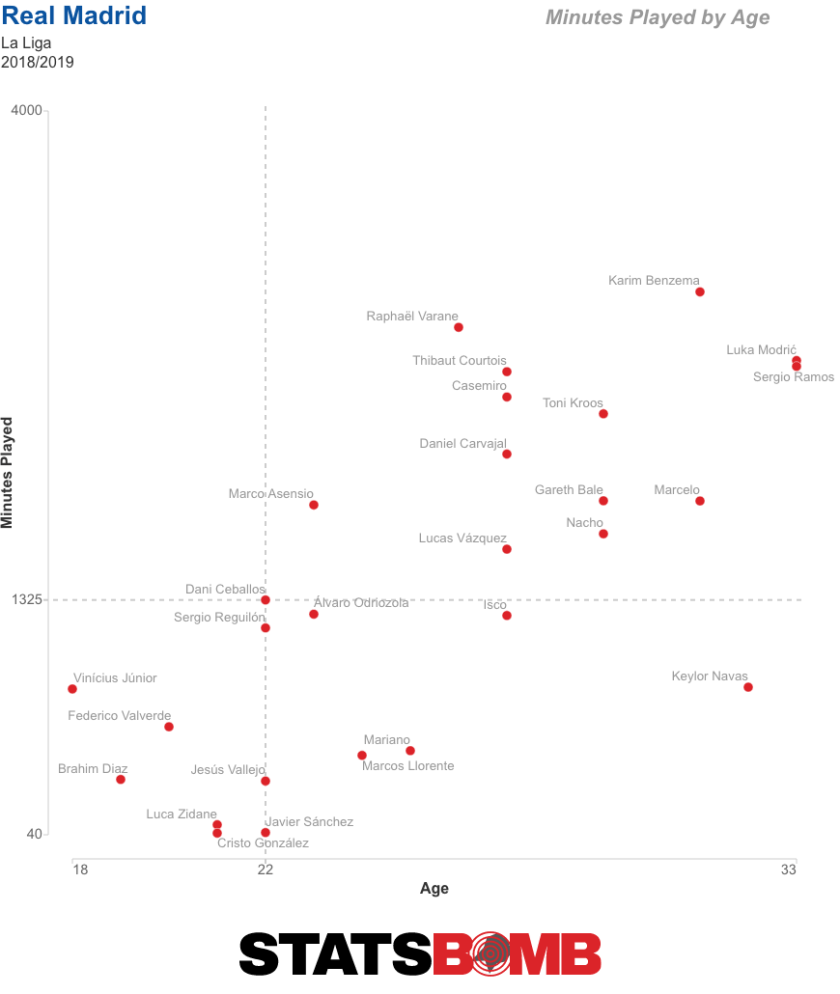
Zidane appears to have certain trust issues with the younger players, but there is enough quality and sufficient numbers in that group to provide good cover across the pitch without a complete overhaul of the squad. High-quality reinforcements in key areas should be enough to again make Madrid genuine challengers both domestically and in Europe.
In La Liga, there is clearly a gap to close to Barcelona, not only in terms of points, but in the numbers underpinning each side. While their defences have been more or less equal this season, at an average of 0.98xG conceded per match, Barcelona’s attack has produced 1.67xG per match to Madrid’s 1.35. Barcelona have been nearly a third of a goal better per match in terms of Expected Goal Difference (xGD) and nearly a full goal in actual goal difference.
From a personnel standpoint, Madrid’s defence looks okay. They have already secured the signing of Porto’s Eder Militão, a highly promising central defender and a worthy competitor to Raphael Varane and Ramos for a starting berth. Right-back is well-covered with Dani Carvajal and Odriozola. On the other side, Reguilón has showed enough in his minutes this season to suggest he would provide competent competition for Marcelo if the Brazilian doesn’t depart. Lyon’s Ferland Mendy has been strongly linked, but if that doesn’t work out, you would think it would be possible to incorporate Marcelo as a kind of late-Dani-Alves-at-Barcelona tucked-in full-back if the midfield structure to work around his weaknesses. Between the sticks, evidence suggests Navas is a better shot-stopper than Thibault Courtois, but it is Navas who is all but certain to move on.
At an xG level, Madrid’s defence has been marginally better this year than it was last season, and while it isn’t close to a Europe or even league-leading number, it would be fine if coupled with a near two-goal-per-match attack, as it was, at least in xG terms in 2017-18. But that is where Madrid have really tailed off this season, as their xG Trendline shows.
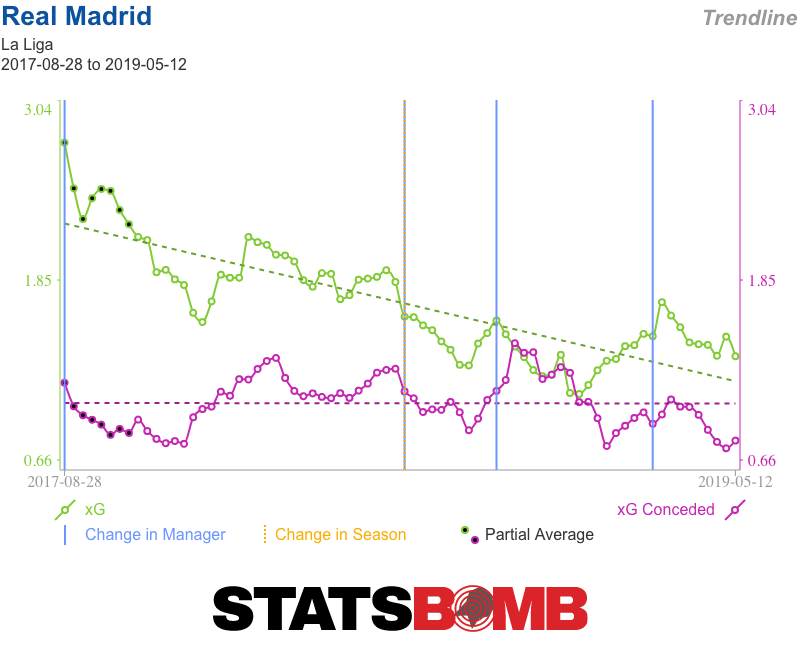
The effect of Cristiano Ronaldo departure is clear to see in the downward trend of Madrid’s xG numbers, the result of both lower shot volume (15.38 per match, down from 18.58 last season) and quality (0.09 xG/shot, down from 0.10xG/shot). In every facet, their attacking numbers have deteriorated.
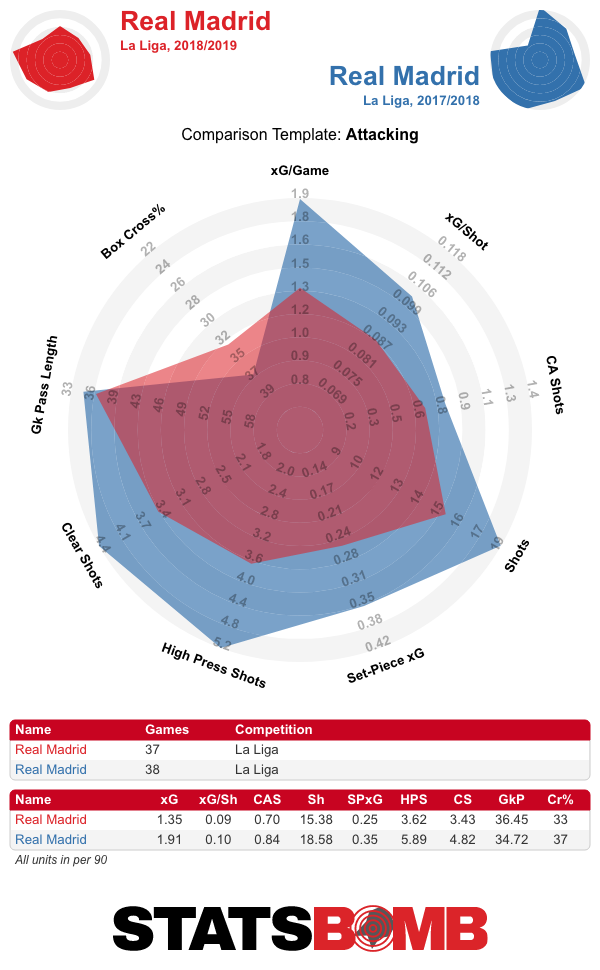
Take Ronaldo out of any attack and there would be some serious rebuilding to be done. His 6.64 shots per 90 last season represented the most any player has managed over either of the last two seasons in the big-five leagues. In that time, Harry Kane is only guy not named Ronaldo or Messi to have averaged over five shots per 90, and unlike the other two, he only did it in one (2017/18) of the two campaigns. Short of picking up a Kane, Kylian Mbappe or Neymar, finding a replacement capable of replicating Ronaldo’s output would have been near impossible.
Madrid elected to pursue the optimistic (if not entirely misplaced) idea that the collective could shoulder the burden of replacing Ronaldo’s individual shot output -- that freed of a more sacrificial role, Karim Benzema could provide something closer to line-leading numbers; that Bale could step out of Ronaldo’s shadow, avoid injuries and increase his output a notch or two; that Asensio could build on a solid 2017-18; that Mariano Díaz, despite certain limitations, could provide good shot volume as a substitute and back up.
But none of those things happened. Benzema has provided more shots, but of worse quality, leaving him about par in terms of xG per 90; Bale has again suffered a series of niggling injuries, has contributed less than before when he has made the pitch and has been left out of the squad entirely in recent weeks; Asensio has had a down year, regressing in terms of both shooting and creative output; Mariano has provided good shot volume when he’s been fit but hasn’t been for half the season.
While all sections of a team are interconnected, and Madrid’s midfield (which we’ll get to later) could also do with some upgrading, the attack is clearly where most of their focus should fall this summer.
It is, then, unsurprising that Madrid are close to (or, according to first AS, then Sky Sports Germany, have already agreed) a €60 million deal with Eintracht Frankfurt for their striker Luka Jovic. While Frankfurt’s front-loaded attacking focus this season raises certain questions over the degree to which their three starting forwards (all of whom have averaged 0.40xG per 90 or higher) would be able to sustain their output in different surroundings, it is hard to argue with Jovic’s numbers. He is in the top 10 across the big-five leagues in terms of both shots (3.85) and xG per 90 (0.51), and he does exactly what Madrid need: he gets in good central positions and finishes well. (And also offers solid playmaking skills on top)
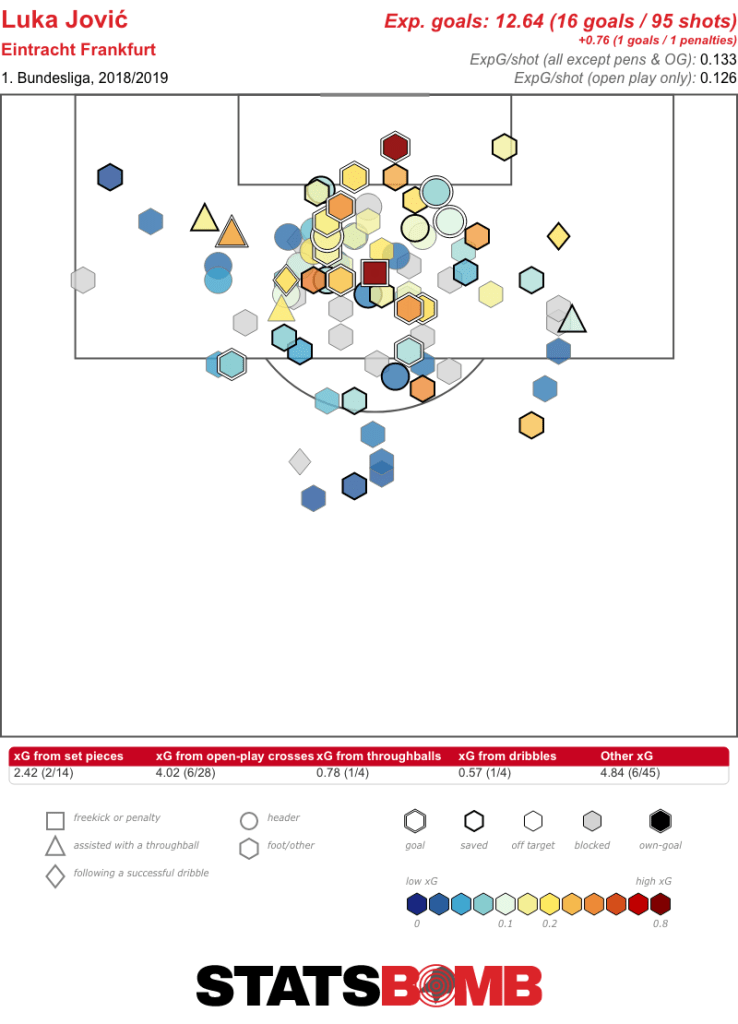
Another player whose arrival at the Bernabeu appears agreed is Eden Hazard. The signing of the Chelsea forward in a €100 million deal (likely to include Mateo Kovacic going the other way in some form or another) is set to be announced in the coming weeks. Most Spanish press reports suggest that the club have accepted that Neymar and Mbappe are likely to again be out of reach this summer, and so Hazard is the star name they have turned to in a bid to revitalise their attack. They believe he can up his goalscoring numbers in Spain and so bring himself into Ballon d’Or contention.
Hazard has hit double figures in the league in five of his seven seasons at Chelsea, but he has never been a prolific shooter or goalscorer. This season, in a campaign in which he’s played over 500 minutes as a central striker in addition to his more habitual left-sided forward role, he’s provided 2.59 shots and 0.23xG per 90. Certainly, if he were to be the only attacking reinforcement, it would be difficult to see how he would really represent a solution to Madrid’s problems. But if they’re adding shots elsewhere, as it seems they are, he brings an impressively well-rounded attacking skill-set capable of adapting to the shape of the forward line. He can be positioned higher and be a direct dribbler into dangerous shooting and assisting locations, but he also has the ability to drop a little deeper and help progress the ball into the final third if there is a more direct player on the other side of the central striker.
The arrival of Hazard would also free Madrid of the need to lean too heavily on Vinícius Junior, the 18-year-old Brazilian who provided a tantalising glimpse of his talent in eight starts between January and March. On the final weekend of the season, he edged just over the 900-minute mark that is usually accepted as a fair starting point from which to draw a more confident picture of a talent from their numbers, and his dribbling (3.55 successful dribbles per 90, a top-25 rate in the big-five leagues this season) and shooting (4.30 per 90, sixth in the big-five leagues) output to date has been impressive. Ration his minutes, improve his shooting locations, help him make better decisions in the final third, and there is a potential star there.
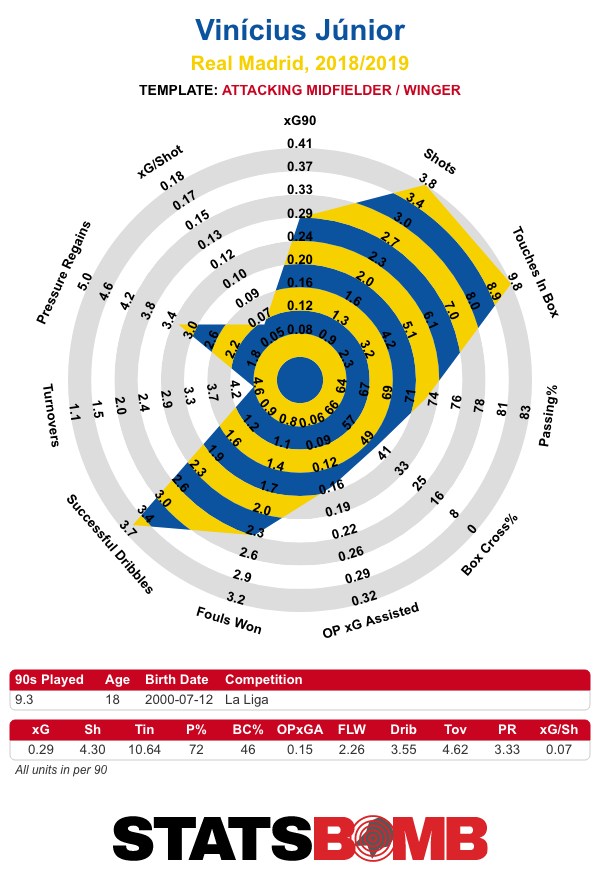
There is now also talk of Madrid showing interest in Liverpool’s Mohamed Salah. He would certainly provide the icing atop the proverbial cake, but even if that ends up being no more than idle chitter-chatter, a mobile attack in which minutes can be spread between Hazard, Jovic, Vinícius, Benzema and Asensio (perhaps even Raúl de Tomás, who Zidane is said to view as a viable backup option after a strong season on loan at Rayo Vallecano, with 3.40 shots and 0.36xG per 90 amounting to 14 goals on a relegated side) looks pretty good. Especially so if you can also add more goals from midfield.
For most of the last three-to-four years, since Casemiro established himself as a regular, the usual midfield trio of him, Luka Modric and Toni Kroos has primarily provided balance and ball progression. In none of the last four seasons have any of them scored more than five times in the league. That trio will, though, most likely be broken up, at least to a certain extent, next season. Even at 33, and in the face of decreasing defensive contributions, Modric is probably worth keeping around for the final year of his contract, but he won’t necessarily be able to carry a full complement of minutes. Casemiro and Kroos (who was slightly less influential on both sides of the ball this season but has now signed a new contract through to 2023) will stay, but others will join.
The brief is to sign players capable of producing a midfield that can better protect the defence (the ease with which Ajax outmanoeuvred them at the Bernabeu made that issue painfully clear) whilst also contributing more to the attack. Two names have been strongly linked: Christian Eriksen and Paul Pogba. Eriksen would be more or less a Modric replacement with more attacking and slightly less directly confrontational defensive output; Pogba is, among other things, a very capable ball progressor, on the pass or on the dribble, and it is also fairly easy to imagine him getting close to double figures in goals if given license to get forward. They are both players around whom existing options could be placed.
The arrival of one or both of them would almost certainly signal the departure of Isco. He is clearly a highly talented player, but the fact that he hasn’t got close to breaking the 2000-minute barrier in league action in any of the last four seasons indicates that Zidane (and even more so Santiago Solari earlier this season) doesn’t trust him enough to give him the central role that he could easily enjoy (and that I, for one, would love to see him in) at another club. At 27, it might be best for both parties if he moves on.
With one deal already done, two more seemingly close to completion and others potentially in the works, Madrid are moving quickly to rebuild after a very difficult campaign. Even with the current squad, their underlying numbers have improved since Zidane’s return. The hope will therefore be that with players of his choosing, including some new star power, they will be better positioned to both overhaul Barcelona and perform better in Europe next season.